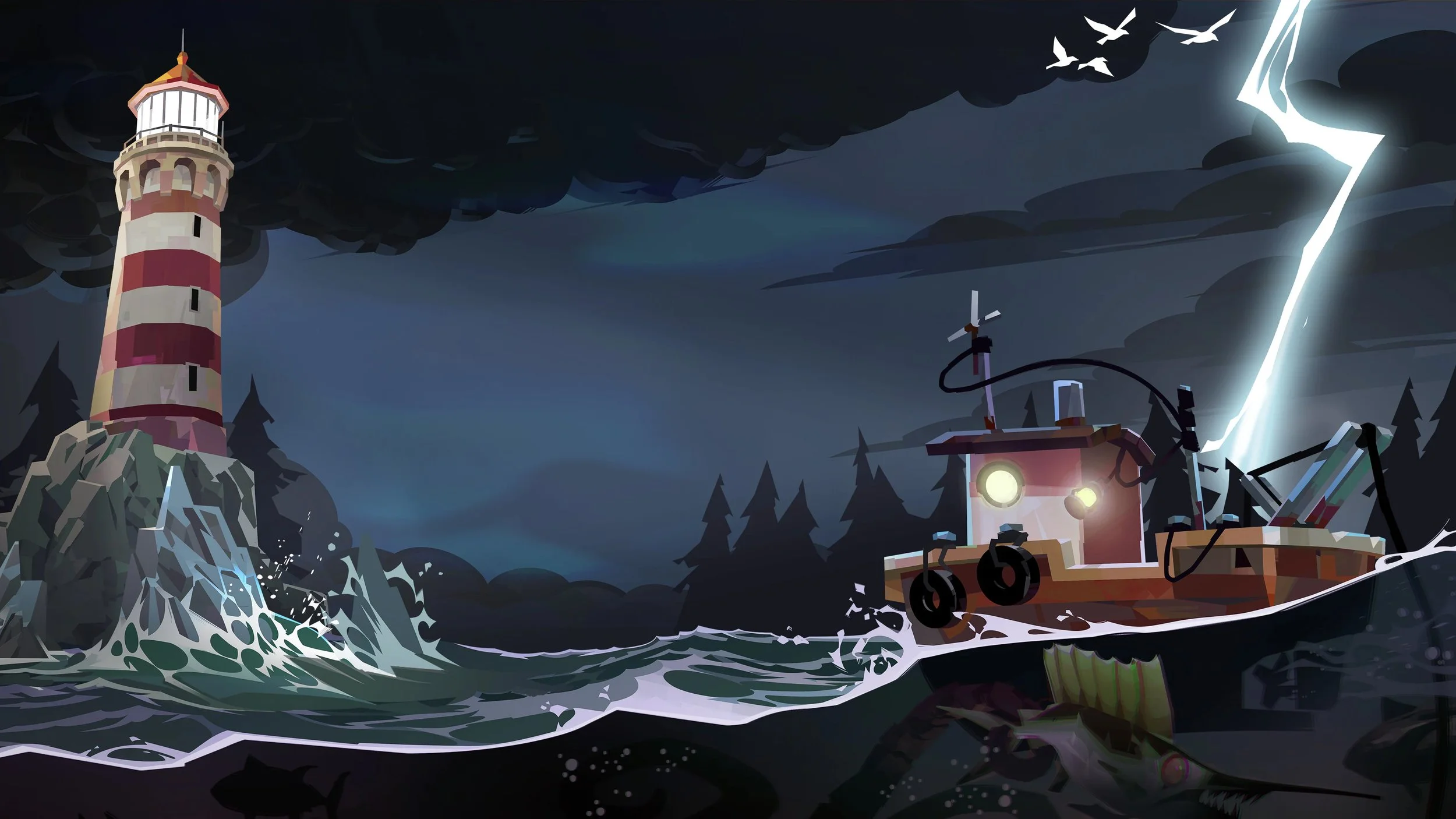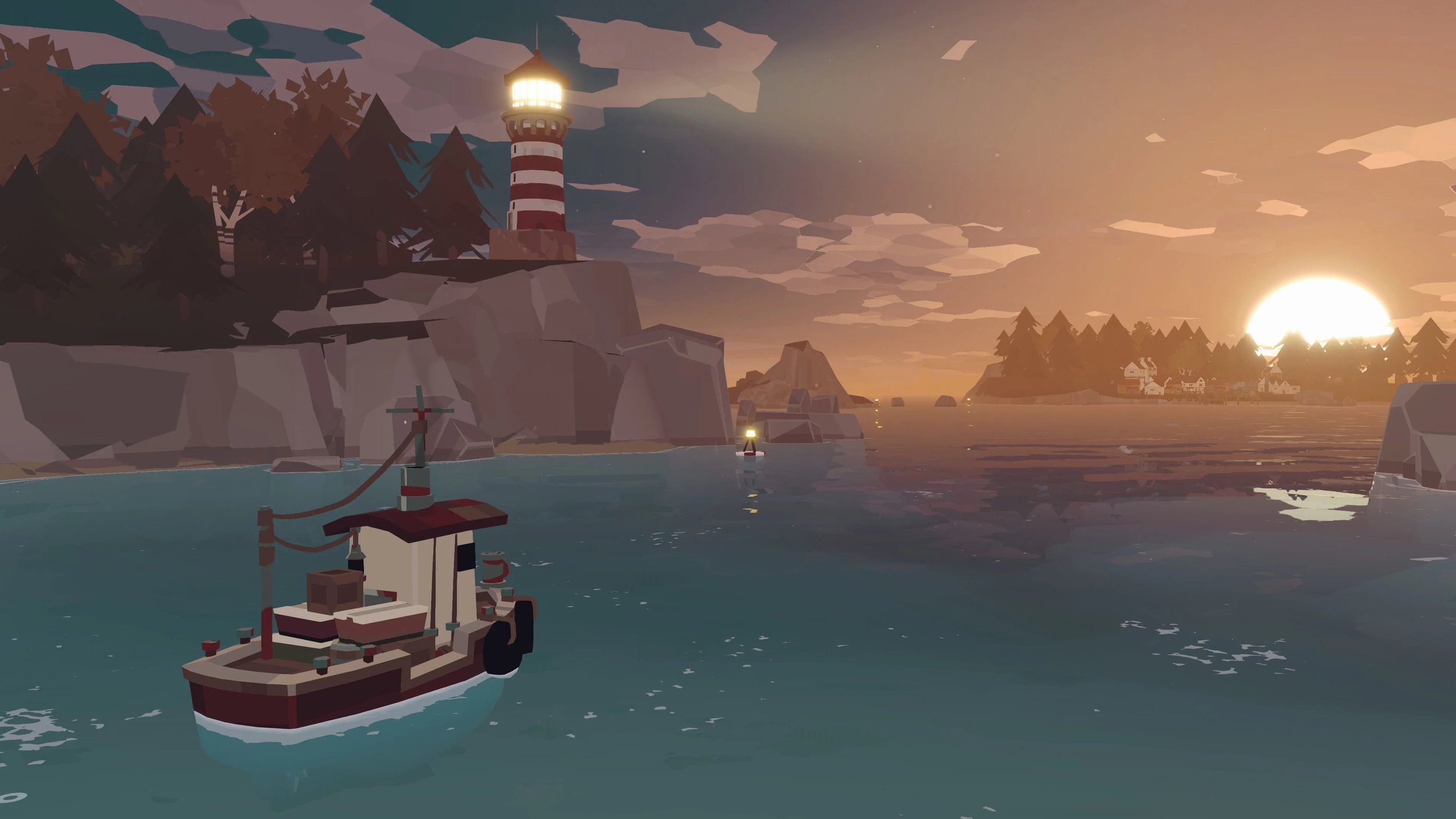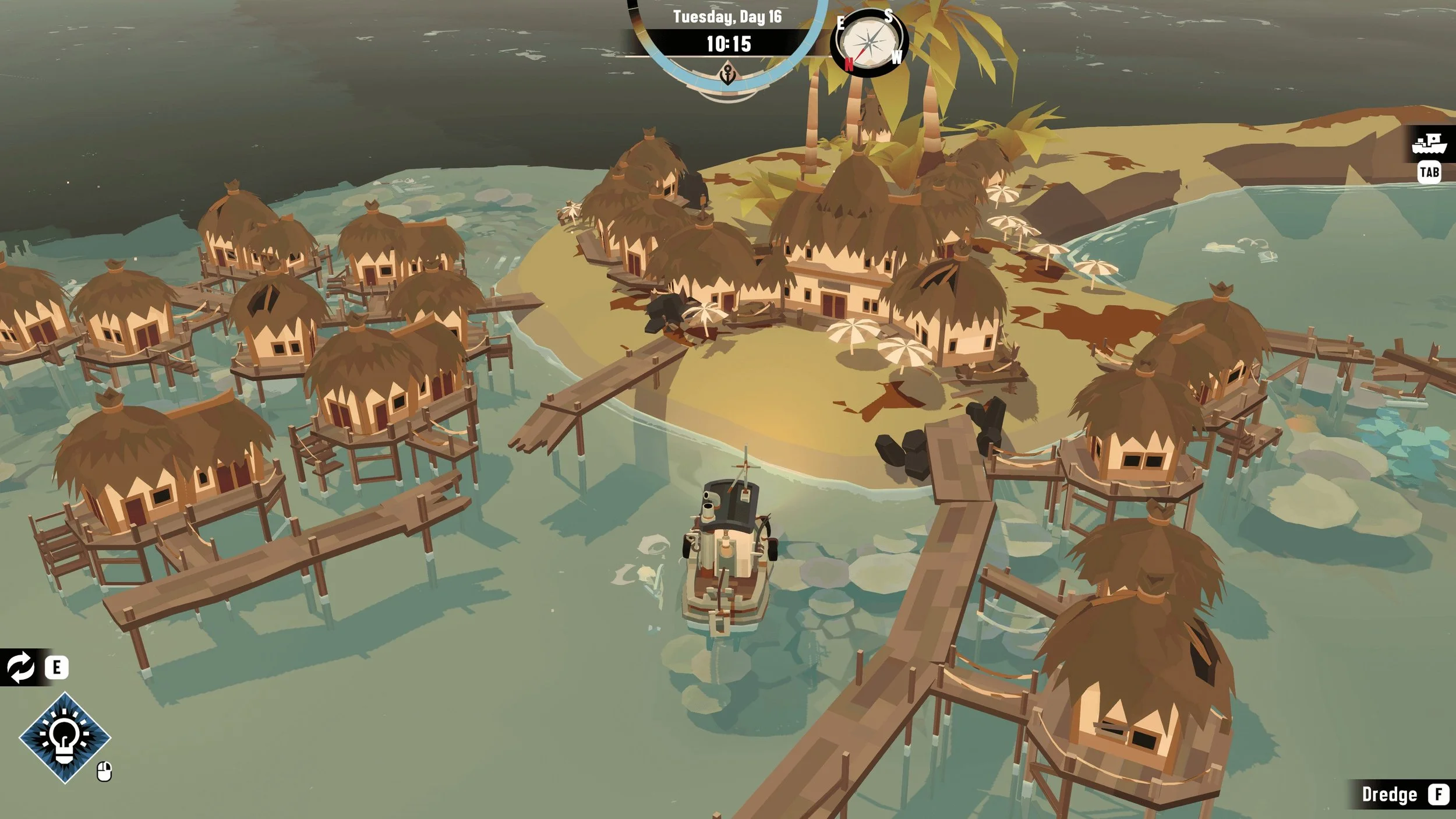DREDGE
Brand new game studios often make bold promises like, “We make fishing fun!” Thankfully, New Zealand-based Black Salt Games manages the unthinkable and fulfills that promise with their debut title: Dredge. Players will find themselves fishing for fiends, and braving the depths after dark in this lovecraftian seascape. Though its story isn’t quite as deep as the depths themselves, Dredge does an excellent job of immersing players within its mysterious open world exploration, thoughtful sound design, and gameplay loop that is as addictive as it is simple.
Like most Cthulhu-adjacent stories, Dredge begins at sea. It keeps a brisk opening pace, careful to show only what it needs to. While the game doesn’t mention who you are or where you’re coming from, it does show an ad poster lying next to your steering wheel. It says plainly: “Angler Wanted,'' which, apparently, is good enough for us to sail boldly into an oncoming hurricane. After making this questionable lifechoice and crashing straight into a cliff face, players will find themselves washed ashore in Greater Marrow. This is Dredge’s primary hub world, a salt-soaked hamlet in the middle of nowhere. The game takes an Animal Crossing-type approach here, immediately giving players a debt to pay off as if it’s a favor. The town’s Mayor graciously lends you an old-ship, sets you back out to sea, and quickly gets you fishing in order to work off this new loan. Pay down what you owe and you’ll soon gain access to new abilities, new missions, and other parts of the town as Greater Marrow’s new resident fisherman. The debt mechanic doesn’t last long in Dredge. After a few brief voyages players can be debt free and then sail the open waters as they please. Once I’d made my first catch, I could not wait to leave port again.
Expeditions in the game’s opening hours have a leisurely clip, encouraging players to relax and take in the sounds of the sea along with Dredge’s gorgeous low-poly art style. The cartoonish, watercolor textures are sure to add a big dose of serotonin to anyone’s day, while the soundtrack comes and goes with the wind. An eclectic mix of oceanic soundscapes and a calming, somber score, the peaceful accompaniments give sailing a distinct feeling of coming home to a familiar hearth at the end of a long day.
Now, are we supposed to be excited about fishing? In this game, yes! Catching fish is easy and keeps things curious with a host of different species to catalog and sell. Players will undock their boat with the press of a button. They’ll control momentum and steering using one joy-stick, while the other joystick can be used to adjust a generous camera angle. It’s all a breeze as Black Salt Games makes sailing clean and accessible. Once you’re asea, fish are easy to spot beneath the ocean’s surface, so you can sail right over and engage in your first fishing minigame.
Sometimes simplicity is best. Fishing, dredging, and storing (yes, storing) are the three primary forms of gameplay outside of sailing. Each of these actions revolve around playing minigames to accomplish each task. There’s nothing particularly original in Dredge’s minigames, but this accessibility makes them hard to put down. Fishing involves pressing one button to catch fish (duh). Dredging has players, again, pressing a single button to dig up treasure. Then, for some extra spice, there’s the classic Resident Evil storage game, a static form of Tetris used to store daily catches and treasures. So, two of the minigames are nearly identical and the other is barely a game at all…this is supposed to be fun? Again, yes! There’s pace and forgiveness to fishing and dredging that make these uncomplicated minis satisfying and serene. Dredge lets players keep their catches no matter what. The consequences are minute and it only takes seconds to accomplish either task. Resource management is just as low stakes. Fish return to the same place as time passes, so if you run out of room in your ship and have to throw something back, it’s not a big deal. Though, that’s not to say that everything in Dredge is as straightforward as it seems.
Upon leaving port for the first time, players will notice Dredge’s day-night cycle. Every inch your boat moves, minutes pass. Time moves swiftly in this game, as a full 24 hours will elapse after only five minutes of sailing. Try to fish or dredge and the seconds soar by even faster. Your boat’s standard engine sails at a snail's pace making it difficult to get far before nightfall. This adds tension to exploration in the game’s onset while also helping the overworld map to feel immense. Players will be anxious to increase their speed so as to get more time out of their day as the other half of Dredge’s day-night cycle does away with all sentiments of safety.
You’re warned from the very beginning not to be out sailing after dark, and the citizens of Greater Marrow are right to warn you. Players will have about three and a half minutes of daylight before the dreaded darkness rolls in. Without light and without sleep, players will experience panic and a slow loss of sanity, which can cause a myriad of hallucinations within the game. Eyes appear out of nowhere, twitching and teeming in the mist. Jagged rocks and boats without captains threaten to destroy your ship. It’s not impossible to cruise at night, but sail too far and for too long at your own risk. Rest is the only cure for panic and players can sleep it off on land at any port they find.
Strange things can happen on land too, though. Dredge flirts with horror and mystery both in its open-world exploration and its NPCs. Does the Mayor of Greater Marrow harbor a great secret? Why is the Lighthouse Keeper so stoic and standoffish, acting as if they’ve seen you before? Why is everyone just a tad strange? It’s enticing, at first, to unravel these mysteries and dig up the dirt on Dredge’s inhabitants. Unfortunately, the tales this game has to tell will leave most wanting more.
Dredge’s main story quest has players working for the cryptic Collector seeking five specific treasures from the depths. These dark items wait in the salty brine, and if you bring them back, the Collector will give you strange new powers from an obviously evil book, definitely not meant to be the Necronomicon. This ultimate fetch quest actually provides decent motivation to explore the game's other ports. Each port has its own unique circumstances to overcome, whether it's creeping vines that cut off your pathways at random or nasty little mutant piranha that will chew through your ship’s hull. You’ll also be introduced to new characters who will push you into smaller mini-fetch quests around each area. These side stories range from poignant and strange, to just plain underwhelming. There are many hints of branching histories, suggestions of a deeper story, but nothing truly pans out or affects your world as a player. This makes it easy to lose connection to your character’s motivation, meaning there doesn’t always feel like there’s a bigger reason for anything the game is asking of you.
Of course, games don’t always need this kind of catalyst. Sometimes the gameplay loop is enough. Dredge comes close, but in walking this line between serene fishing simulator and lovecraftian mystery, you can’t help but want more from its story content. That, and its RPG system of building up your vessel runs out of steam before the game’s closing moments. A little more than halfway into the game, you’ll have everything near to fully upgraded. The few bells and whistles left are easy to ignore as none of them dramatically change or improve the experience, and certainly were not necessary to beat the game.
Dredge is a rare beast: a lovecraftian open-world fishing RPG, with excellent exploration and secrets that satisfy but never truly surprise. Its fetch quest formula and light RPG systems also wear a bit thin, but players are still sure to enjoy every moment they spend out on its open waters. It takes minutes for hours to pass whether it’s in-game or on the couch. This maiden voyage has plenty of spooky thrills, fiendish fish, and enough demonic delights to keep players hooked until the end.
VERDICT: Play This Game




